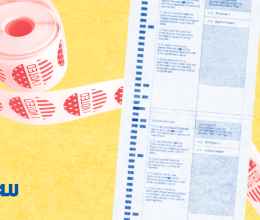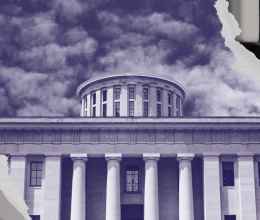Five ACLU staff attorneys.
Multiple volunteer attorneys, clerks, and legal assistants.
Hundreds of hours of staff time fighting unfair restrictions on Ohioans’ right to vote.
On Monday, August 11, the ACLU of Ohio and ACLU National Voting Rights Project went to court in Columbus to challenge cuts to early voting that will hurt working Ohioans. The team is pictured above on the courthouse steps after the hearing.
The ACLU asked Judge Peter C. Economus to block laws that would make it more difficult for people to vote. These include Senate Bill 238, which would eliminate a week of early voting and the ability for Ohioans to register and cast their ballot on the same day, as well as a directive from Secretary of State Jon Husted cutting all evening and nearly all weekend early voting hours.
Read additional background information on the case.
Read the documents filed in NAACP v. Husted.
During the hearing on Monday, ACLU attorneys made their case clear: these cuts would hurt voters who have inflexible schedules and need early in-person voting hours that fall outside of the typical work day. In particular, African American voters would suffer because they are far more likely to use early in-person voting, mostly due to popular Souls to the Polls programs operated by black churches.
Under the current rules, voters will only have four hours on a single Sunday to vote. This hardly leaves enough time for churches to pick up voters throughout the community, drop off children at churches that are providing child care, and take voters to their local boards of elections to vote.
In past elections, voters have had multiple Sundays to vote early in person. ACLU Staff Attorney Sean Young said during the hearing, “In 2010, 78% of African Americans had multiple Sundays to vote early. In 2014, 0% will have multiple Sundays to vote early.”
Since early voting was introduced in 2005, it has become incredibly popular among voters, with hundreds of thousands of Ohioans choosing to cast their ballot early in person. Early voting has been credited with alleviating the long lines that plagued the 2000 and 2004 presidential elections.
If early voting is popular and successful, why are some politicians trying to limit it?
The answer isn’t much clearer after the August 11 hearing.
The state claims that it needs to eliminate same-day registration, commonly known as Golden Week, to prevent fraud. However, they have not been able to produce evidence that same-day registration has led to fraud, or that voter fraud has increased since it was introduced.
Claims that early voting makes election administration harder or costlier also ring hollow. In comparison, what is the cost of another election riddled with confusion? How much is it worth to ensure all Ohioans are able to cast their ballots? The benefits of early voting far outweigh any possible negatives.
The fight for early voting will not end here. The ACLU will continue to push for evening and weekend early voting hours and Golden Week—not just for the 2014 election, but for all future elections.






